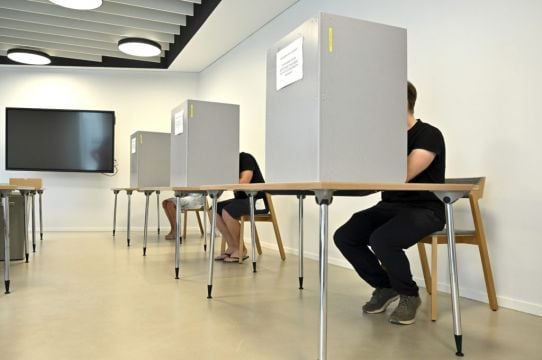The far-right Alternative for Germany, or AfD, was on track to become the strongest party in a state election for the first time on Sunday in the country’s east, and was roughly level with mainstream conservatives in a second vote, exit polls showed.
A new party founded by a prominent leftist was also making an immediate impact, while the parties in Chancellor Olaf Scholz’s unpopular national government were set for weak results.
The exit polls for ARD and ZDF public television put support for Alternative for Germany, or AfD, at 30.5-33.5% in Thuringia and 31.5% in Saxony.
They put the centre-right Christian Democratic Union, the main opposition party at national level, at 24.5% in Thuringia and 31.5-32% in Saxony.
It is extremely unlikely that any other party will agree to put AfD in power by joining it in a coalition.
Even so, its strength is likely to make forming new state governments extremely difficult.
The strength of the new Sahra Wagenknecht Alliance, or BSW, which was seen taking up to 16% of the vote in Thuringia and 12% in Saxony, adds another level of complication.
“This is a historic success for us,” Alice Weidel, a national co-leader of AfD, told ARD.
She described the result as a “requiem” for Mr Scholz’s coalition.

The CDU’s national general secretary, Carsten Linnemann, said his party will stick to its longstanding refusal to work with AfD.
Ms Weidel denounced that as “pure ignorance” and said that “voters want AfD to participate in a a government”.
Deep discontent with a national government notorious for infighting, anti-immigration sentiment and scepticism toward German military aid for Ukraine are among the factors that have contributed to support for populist parties in the region.
AfD is at its strongest in the formerly communist east, and the domestic intelligence agency has the party’s branches in both Saxony and Thuringia under official surveillance as “proven right-wing extremist” groups.
Its leader in Thuringia, Bjorn Hocke, has been convicted of knowingly using a Nazi slogan at political events, but is appealing.
Mr Scholz’s centre-left Social Democrats at least appeared set to remain in the two state legislatures, despite some election fears that they would not.
But the environmentalist Greens appeared set to lose their seats in Thuringia.
The two parties were the junior coalition partners in both outgoing state governments.
A third state election follows September 22 in another eastern state, Brandenburg, currently led by Mr Scholz’s centre-left Social Democrats.
Germany’s next national election is due in a little over a year.







